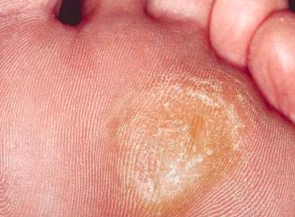
A callus is a hardened and thickened area of dead skin that often develops around the heel, ball of the foot and/or the toes. Callus has a rubbery feel to it and may appear a pale yellow colour, though if the skin is dry, can feel very hard, have a white appearance and may even develop cracks. Callus can vary greatly in size and may span your entire heel, or just a coin-size patch on the side of your toe. As callus is formed from dead skin cells and areas of callus contain no nerve endings, meaning they have no feeling. Any sensations you experience when touching a callus are from the healthy underlying skin.
Developing callus is actually a response to either repeated friction and excess pressure. By developing thicker and firmer skin in a high-impact area, your body is protecting itself from further damage like skin breaks which would otherwise leave you vulnerable to infection. Hence, callus often doesn’t cause any problems or pain. Some examples of causes include:

When a callus grows too thick, however, it can put excess pressure on the healthy skin beneath and cause irritation, tenderness and difficulty comfortably wearing shoes.
While many won’t need to seek treatment for their callus, treatment is indicated when the skin beneath the callus becomes painful, uncomfortable, or limits your ability to comfortably wear shoes or carry out activities. If you have diabetes or any conditions that impact your ability to feel, it is also very important that you keep your callus well managed as the dead skin means your sensation is diminished further. As highly-skilled podiatrists, we are able to safely, effectively and painlessly remove the bulk of the callus in the clinic, during your appointment. A small layer should be left intact to continue to protect your skin as per its original intent. Under no circumstances should you try to cut the callus off by yourself using sharp instruments. Improper techniques can damage the healthy surrounding skin, resulting in cuts and infection. If callus is an ongoing issue for your feet, we’ll conduct an assessment to determine the cause(s) of the callus and advise you on how to reduce the onset of callus formation in the future.
.png)
Since introducing shockwave therapy, we’ve helped many of our patients avoid surgery for certain conditions. Here's what you
need to know about shockwave treatment and how it works.
.png)
This Mother’s Day, consider a practical, medically safe, and confidence-boosting gift: a professional KeryFlex nail restoration treatment. It’s a simple, effective, and medically safe way to instantly transform the appearance of toenails.

In some cases like arthritis, continuing to stay active is one of the best things you can do for your joints. Is the same true if you're in pain or have an injury?

A stroke is New Zealand's second single biggest cause of death and a leading cause of serious adult disability. Here's how podiatry can help in your rehabilitation.
Keeping your family on their feet and helping them to walk, run, play and exceed their goals is why we love getting up in the morning.
Ground Floor, One Health Building
122 Remuera Rd, Remuera
Auckland 1050, New Zealand
| MON - FRI | 7:30am – 6:30pm |
| SAT | 8:30am – 4:30pm |
| SUN | Some availability |
Make an Appointment
Online Schedule